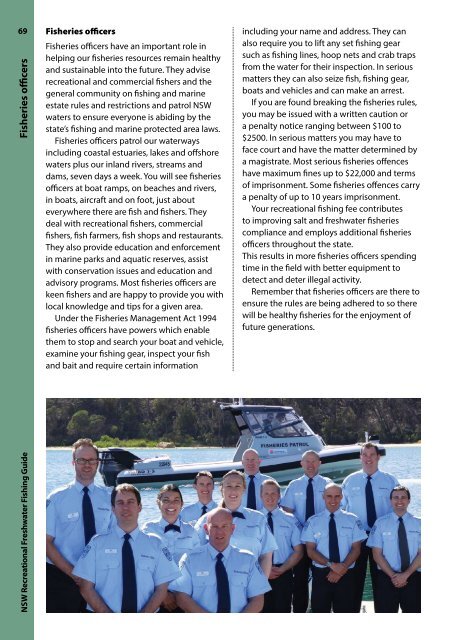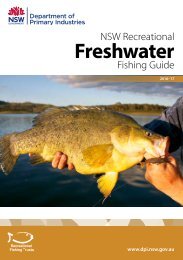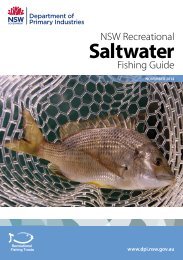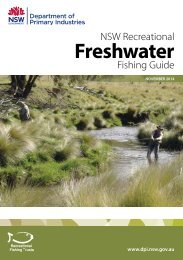freshwater-recreational-fishing-guide-2018-19
You also want an ePaper? Increase the reach of your titles
YUMPU automatically turns print PDFs into web optimized ePapers that Google loves.
69 Fisheries officers<br />
NSW Recreational Freshwater Fishing Guide Fisheries officers<br />
Fisheries officers have an important role in<br />
helping our fisheries resources remain healthy<br />
and sustainable into the future. They advise<br />
<strong>recreational</strong> and commercial fishers and the<br />
general community on <strong>fishing</strong> and marine<br />
estate rules and restrictions and patrol NSW<br />
waters to ensure everyone is abiding by the<br />
state’s <strong>fishing</strong> and marine protected area laws.<br />
Fisheries officers patrol our waterways<br />
including coastal estuaries, lakes and offshore<br />
waters plus our inland rivers, streams and<br />
dams, seven days a week. You will see fisheries<br />
officers at boat ramps, on beaches and rivers,<br />
in boats, aircraft and on foot, just about<br />
everywhere there are fish and fishers. They<br />
deal with <strong>recreational</strong> fishers, commercial<br />
fishers, fish farmers, fish shops and restaurants.<br />
They also provide education and enforcement<br />
in marine parks and aquatic reserves, assist<br />
with conservation issues and education and<br />
advisory programs. Most fisheries officers are<br />
keen fishers and are happy to provide you with<br />
local knowledge and tips for a given area.<br />
Under the Fisheries Management Act <strong>19</strong>94<br />
fisheries officers have powers which enable<br />
them to stop and search your boat and vehicle,<br />
examine your <strong>fishing</strong> gear, inspect your fish<br />
and bait and require certain information<br />
including your name and address. They can<br />
also require you to lift any set <strong>fishing</strong> gear<br />
such as <strong>fishing</strong> lines, hoop nets and crab traps<br />
from the water for their inspection. In serious<br />
matters they can also seize fish, <strong>fishing</strong> gear,<br />
boats and vehicles and can make an arrest.<br />
If you are found breaking the fisheries rules,<br />
you may be issued with a written caution or<br />
a penalty notice ranging between $100 to<br />
$2500. In serious matters you may have to<br />
face court and have the matter determined by<br />
a magistrate. Most serious fisheries offences<br />
have maximum fines up to $22,000 and terms<br />
of imprisonment. Some fisheries offences carry<br />
a penalty of up to 10 years imprisonment.<br />
Your <strong>recreational</strong> <strong>fishing</strong> fee contributes<br />
to improving salt and <strong>freshwater</strong> fisheries<br />
compliance and employs additional fisheries<br />
officers throughout the state.<br />
This results in more fisheries officers spending<br />
time in the field with better equipment to<br />
detect and deter illegal activity.<br />
Remember that fisheries officers are there to<br />
ensure the rules are being adhered to so there<br />
will be healthy fisheries for the enjoyment of<br />
future generations.<br />
Fisheries officers








